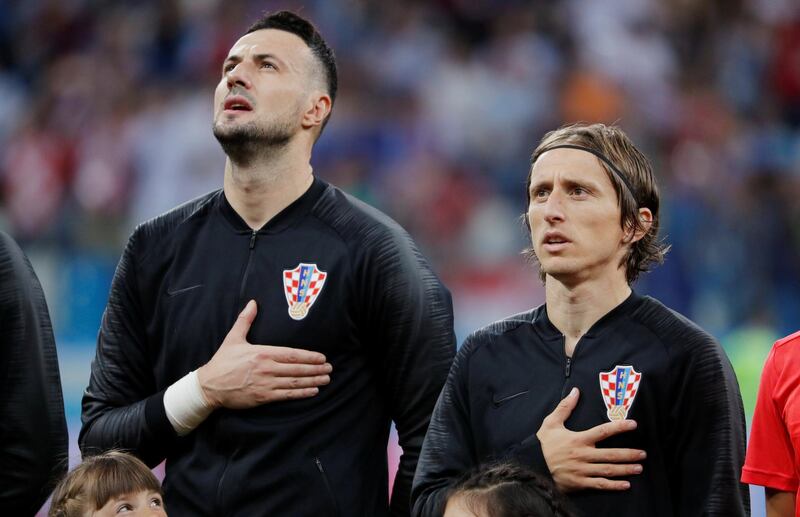Before every match at this World Cup, Croatia's goalkeeper and captain, Danijel Subasic and Luka Modric have sung the national anthem side by side, as they have been since they were boys. On Sunday, they will do so again as Croatia play France in the final — their country's greatest footballing achievement so far.
It has been a long road here for Croatia, born from the turbulent break-up of the former Yugoslavia in the 1990s, and for the two players whose families were refugees from the violence of that time
Subasic, 33, and Modric, a year younger, both grew up in the city of Zadar and met during football training at the Stanovi stadium.
Modric's family came to the city when he was 6, after his beloved grandfather Luka was killed while watching over his cattle. They lived for years in a shabby old hotel with other refugees from all over Zadar county. Neighbours from that time have described him as a small boy with blonde hair and skinny legs who kicked a football from the moment he opened his eyes until he went to bed.
Subasic lived just 200 metres from the stadium and started training at the age of 6. When he was 10 he asked his coach if he could stand in goal. He has played there ever since.
Subasic and Modric are like brothers, says Boja Subasic, the goalkeeper's mother, devoted to each other and always talking on the phone when they are not together.
Both have played a key part in Croatia reaching the final. Modric, considered one of the best midfielders of his generation, has driven the team forward and scored two goals, while Subasic made three saves in the quarter-final penalty shoot-out against Russia.
"We have the most experienced players in the tournament in terms of big matches played for their clubs — now they have done it with their national team," said Ivan Malik, an economist who played football with Subasic and Modric as a child.
"The guys are a great group of individuals, and they have all the support from the Croatian people at home and abroad. I truly believe that they can bring [the World Cup] home."
Such belief is a far cry from Croatians' expectations before Russia 2018, after the team managed only a draw with Finland in their last qualifying match for the tournament.
_______________
Read more:
[ Playing France in the final will be 'greatest moment of our lives', says Dalic ]
[ Modric's place in the World Cup final with Croatia is a triumph of character ]
[ Ivan Rakitic confident Croatia will have the 'energy' to defeat France ]
_______________
Croatia's previous best performance was third place in the 1998 World Cup in France, their first appearance in the tournament. They failed to get past the group stages after that and even missed the 2010 World Cup in South Africa.
During these years, Croatian football saw little success or enthusiasm, especially from the fans. The game was tainted by corruption under Zdravko Mamic, former acting vice president of Dinamo Zagreb football club. Considered the big boss of Croatian football, he ordered national team coaches on which players to play, allegedly to favour those he represented as an agent.
Mamic was sentenced last month to six-and-a-half years in prison for corruption after a trial at which Modric and Croatian defender Dejan Lovren, both testified about their former agent.
Zlatko Dalic, who took charge as the national coach in October last year, was the first to be appointed without Mamic's sanction since 2008.
Under Dalic, the team have grown from match to match, but the first traces of the footballing euphoria now gripping Croatia only appeared after the 3-0 win over Argentina in the group stage.
_______________
Read more:
[ 'I will stay Ainawi for ever': Croatia manager who made his name at Al Ain ]
_______________
A wave of optimism has swept the country with each successive win. Suddenly the national side, once seen as a prime example of what was wrong with Croatia, became a focal point of positivity. All economic problems and social divisions were put side and the people started believing in their team.
And the team has not let them down, grinding out wins in their last three games, all of which went into extra time – two of them ending in penalty shoot-outs.
"Three games in a row they managed to return after conceding a goal. These guys are amazing. Barely alive, but still running," said Subasic's father, Jovo. "I am proud of my son, but all of them, as a team, are magnificent."
Ahead of the final the Croatian media have been reporting on almost nothing except football. Social networks are flooded with videos, photos and memes of the Croatian team. Everyone wants to be a part of this fairy tale. Just one more match, and the dream shared by Croatia's four million people could come true.
"What a difference a few victories can make for 11 men running around foreign fields kicking a ball. Croatia is more united in one goal – winning the World Cup – than anything I have seen in my time here," said Paul Bradbury, owner of the country's largest daily news service in English, Total Croatia News.
"Walking around the streets of Osijek after the win against Denmark, it was a pleasure to see the celebrations and genuine joy of people in a region who have had little to cheer about in years."
Croatia is in the World Cup final. "The World cup final" – these words have been both shouted out or whispered slowly in shock since the semi-final win over England on Wednesday. Passionate fans have been roaring their team on ever louder until now; in the break before the final, there is the sweet and nervous silence of great expectation.






